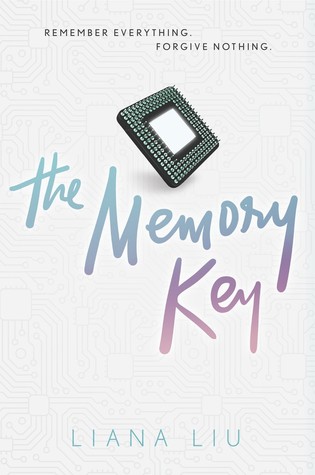
The Memory Key
By Liana Liu
Expected publication March 3, 2015 by HarperTeen
A heroic incident causes damage to Lora's memory key and she starts remembering things she never has before. These new memories seem to suggest that something other than a car accident happened to her mother, that perhaps it wasn't an accident after all. Now, Lora will stop at nothing to uncover the truth, no matter how dangerous it may be.
Sometimes I think I read too much speculative fiction. Sometimes I wonder if that makes me too picky about my speculative fiction particularly for middle-grade or teen audiences. And sometimes I wonder if that makes me dislike books that I might not otherwise have problems with or if the books just sometimes aren't that good.
Obviously, I know that not all books are winners. But let's take this book. This is a book that I wonder if I might have enjoyed more if I didn't read quite so much speculative fiction. It's got an interesting premise: set in a future version of our world overrun with an Alzheimer's-like disease, people are implanted with memory keys which help them retain all their memories. Science such as this leads to interesting questions about privacy - where are those memories being stored? Who has access to them? Who decides if and when a memory should be altered? Would we really want to allow the government or a private corporation access to our brains like this?
Aside from these interesting questions, though, this book doesn't have much going for it, at least not to my speculative fiction-addled brain. Though it's clear this book is set in the future, there is very minimal world-building. Readers are given the basics of the Vergets epidemic and the history of the scientists working to combat it. But the setting is very vague otherwise - how far in the future are we looking? I'm pretty sure it takes place in the United States, but I'm not sure of anything more specific than that.
And then there's Lora. For much of the book, I found her unbelievable and flat. Her reactions to the incredible situations she keeps finding herself in don't seem reasonable. She seems to have very little emotional affect - even when describing a previous crush or an embarrassing moment, she seems distanced from any actual emotions that would be connected to these memories. Worse, even her descriptions of the grief she feels at losing her mother felt flat for me. In addition, her reactions don't seem normal. When her memory key begins to malfunction, she doesn't seem overly concerned. Liu tells me that she's so happy to have memories of her mother that she ignores the urge to fix her key, but she doesn't show me in ways that make me believe her. Lora also seems to have very little sense of logic; her investigations into her new memories and her mother's accident seem haphazard at best, if not just plain lucky.
Because of Lora's flat affect, the romance completely bombed for me. It felt both unnecessary and disingenuous. The twist also wasn't as compelling for me for the same reason. All of these bits add up to a book that I found flawed and uninteresting. I wonder, though, if I didn't read so much excellent speculative fiction if I would have noticed some of these things as much. There are some good action sequences in the book, and it moves along relatively well. Other readers might not see the twists coming, either. Ultimately, this one just didn't really work for me.
Thanks to the publisher for a digital advance reader's copy, provided via Edelweiss.
No comments:
Post a Comment